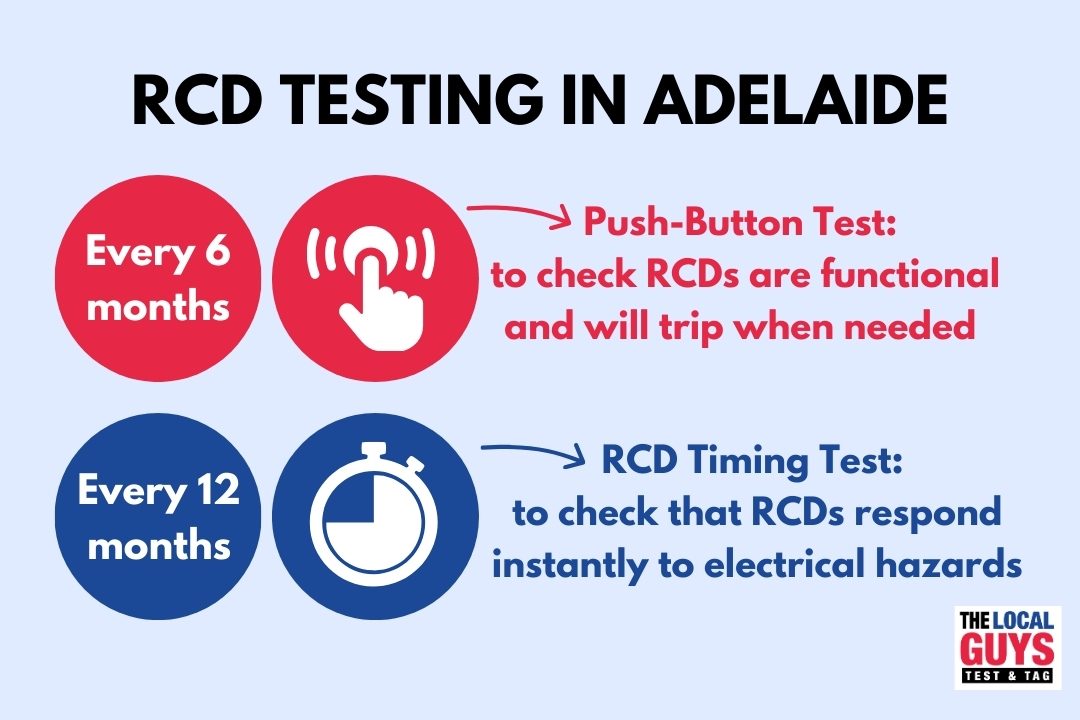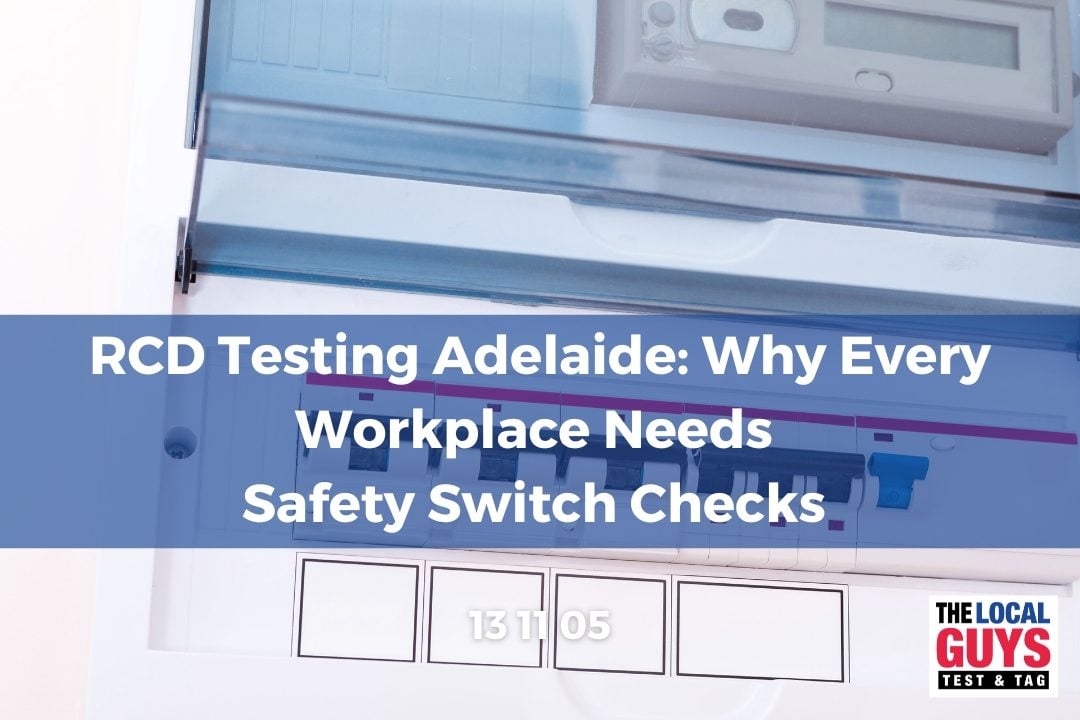Electrical faults account for a significant portion of workplace accidents in South Australia, and malfunctioning safety switches increase the risk of electric shock and fire. This article explains why regular RCD testing is non-negotiable for Adelaide businesses by covering what RCD testing entails, the governing Australian and SA regulations, the step-by-step inspection process, recommended intervals for different environments, key benefits for employees and assets, how to select a qualified provider, and answers to common workplace concerns. Whether you manage a construction site, manufacturing plant or office building, understanding and implementing safety switch checks ensures compliance with AS/NZS 3760:2022, safeguards your team and minimises downtime.
What Is RCD Testing and Why Is It Essential for Adelaide Workplaces?
Residual Current Device (RCD) testing is the professional inspection and verification of safety switches to confirm they disconnect power within the required trip time. This procedure directly prevents electric shock and reduces fire hazards by detecting current leakage. In Adelaide workplaces subject to WHS legislation, routine RCD testing is a legal requirement that also forms a core component of any effective electrical safety management plan.
What Is a Residual Current Device (RCD) or Safety Switch?
Residual Current Devices, commonly called safety switches, are electrical protection devices that constantly monitor the balance between live and neutral currents. When ab RCD detects a leakage of as little as 30 mA, it cuts power within milliseconds to prevent harm. This safety mechanism protects personnel from electrical hazards and prevents overheating or ignition of wiring under fault conditions.
How Do RCDs Prevent Electric Shock and Fire Hazards?
RCDs prevent injury and damage by instantly disconnecting circuits upon sensing an imbalance between incoming and outgoing current. When conductive parts become live due to insulation failure or moisture ingress, the device trips within 300 ms, eliminating the path for harmful leakage current and reducing the chance of electrical fires or severe shocks.
What Are the Different Types of RCDs Used in Workplaces?
Below is a comparison of the principal RCD types deployed across Adelaide’s commercial and industrial settings.
| RCD Type | Characteristic | Typical Application |
|---|---|---|
| Type AC | Detects alternating current leakage only | General power outlets |
| Type A | Senses both alternating and pulsating leakages | Machinery with electronic components |
| Type B | Handles DC and high-frequency leakage | Inverter drives and EV charging points |
| Fixed RCD | Permanently wired into switchboards | Building distribution switchboards |
| Portable RCD | Plug-in device for temporary power tools | Construction sites and outdoor events |
These variations ensure that Adelaide workplaces have the precise level of fault detection needed for their specialised equipment and environment.
What Are the Australian Standards and South Australian Regulations Governing RCD Testing?
Compliance with both national standards and state regulations underpins electrical safety and legal adherence. AS/NZS 3760:2022 sets out testing intervals and procedures, while South Australia’s Work Health and Safety Act and the Electricity Act 1996 impose local obligations for record-keeping and routine inspections.
What Does AS/NZS 3760:2022 Require for RCD Testing Frequency and Procedures?
AS/NZS 3760:2022 mandates:
- Visual Inspection – Verify device integrity and absence of physical damage.
- Push-Button Testing – Manually trip the RCD every six months by pressing the test button.
- Trip-Time Test – Measure disconnection time using calibrated test instruments for fault simulation.
Adhering to these intervals ensures that safety switches remain responsive and in good working order.
How Do South Australian WHS and the Electricity Act 1996 Affect Workplace RCD Compliance?
Under South Australian WHS regulations, all workplaces must manage electrical risks through regular inspections and testing by a competent person. The Electricity Act 1996 requires detailed records of each safety switch test to be retained for a minimum of five years, with failure to comply subject to enforcement action.
What Are the Compliance Requirements for Adelaide Commercial and Industrial Workplaces?
Adelaide businesses must:
- Engage a licensed electrician or authorised Test and Tag technician for RCD inspections.
- Maintain a test register that logs date, test results, and corrective actions.
- Label switchboards with last test date and next due date.
- Address any failed devices immediately by repair or replacement.
These measures protect employees and demonstrate due diligence under both AS/NZS 3760:2022 compliance standards and South Australian law.
How Is RCD Testing Performed in Adelaide?
Professional RCD testing combines visual checks with functional measurements to certify safety switch performance. Only qualified personnel with the appropriate licence and training may conduct trip-time tests.
What Are the Step-by-Step Procedures in RCD Testing?
A standard RCD test comprises:
- Visual inspection of switchgear and cabling for damage or corrosion.
- Manual push-button operation to confirm immediate disconnection.
- Professional timed RCD test using calibrated testers to record disconnection speed.
- Identification and remediation of any faults detected.
- Updating the compliance register with results and next due date.
Completing each step rigorously ensures each safety switch can respond under fault conditions.
Who Is a Competent Person Qualified to Conduct RCD Testing?
A competent person holds:
- A current electrical licence issued by SafeWork SA.
- Training in AS/NZS 3760:2022 test procedures.
- Demonstrated experience with test instruments and reporting software.
This combination of credentials affirms that the inspector can accurately evaluate and document safety switch integrity.
How Are RCD Test Results Documented and Reported for Compliance?
Test outcomes are recorded in a central register—either digital or paper—capturing:
- Facility location and circuit reference.
- Device type, make and model.
- Test date, trip time measurement and pass/fail status.
- Corrective actions taken for any failures.
Retaining these records for at least five years meets statutory requirements and facilitates audit transparency.

How Often Should RCDs Be Tested in Different Adelaide Workplace Environments?
Testing intervals adjust according to the severity of electrical risk and device usage patterns, ensuring proportional safety management across sectors.
What Are the Recommended Testing Intervals for Construction, Manufacturing, and Office Settings?
The following table outlines typical intervals for push-button and trip-time RCD tests:
| Environment | Push-Button Interval | Trip-Time Interval |
|---|---|---|
| Construction | 3 months | 6 months |
| Manufacturing | 6 months | 12 months |
| Office Administration | 6 months | 12 months |
High-usage and hostile environments demand more frequent verification to maintain reliable protection.
Why Is More Frequent Testing Required in High-Risk or Hostile Workplaces?
In settings with heavy equipment, dust or moisture, protective devices encounter harsher conditions and increased wear. Conducting tests more often uncovers degradation early, preventing undetected faults that could lead to injury or fire.
How Do Push-Button and Professional Trip-Time Tests Differ in Frequency and Purpose?
Push-button tests are user-operated checks that quickly verify basic operation and should be performed more often. Professional trip-time tests use precise instrumentation to measure response time under load and require technical expertise, justifying longer intervals between inspections.
What Are the Benefits of Professional RCD Testing for Adelaide Businesses?
Engaging certified technician for routine safety switch checks delivers value beyond mere legal compliance by preserving assets, reputation and workforce wellbeing.
How Does RCD Testing Protect Employees and Minimise Workplace Injuries?
Routine testing ensures safety switches will react instantly to current leakage, preventing electric shock incidents. This proactive protection reduces injury rates and fosters a safer work environment.
How Does Regular Testing Safeguard Electrical Assets and Reduce Downtime?
By identifying early signs of device fatigue or wiring faults, professional testing prolongs equipment life and avoids unplanned shutdowns. Well-maintained circuits operate reliably, supporting continuous production and service delivery.
How Can RCD Testing Improve Business Reputation and Insurance Compliance?
Demonstrating a documented safety program enhances corporate credibility and may qualify businesses for lower insurance premiums. Certified testing reports serve as proof of diligence in risk management when negotiating coverage.
How to Choose a Qualified RCD Testing Provider in Adelaide?
Selecting the right service partner ensures effective safety switch inspections tailored to your facility’s needs and regulatory obligations.
What Qualifications and Experience Should You Look for in an RCD Testing Technician?
Seek providers who hold:
- A current SA electrical licence.
- A Test and Tag license.
- AS/NZS 3760:2022 assessment credentials.
- Several years of experience testing both fixed and portable RCDs.
These credentials confirm expertise in fault detection methods and reporting standards.
Why Is Local Adelaide Knowledge Important for Reliable RCD Testing Services?
Familiarity with South Australian WHS requirements and local network conditions enables precise compliance advice. Local technicians understand weather-related risks and common installation practices in Adelaide workplaces.
What Should Be Included in a Comprehensive RCD Testing Service and Report?
A full-service offering delivers:
- On-site visual and functional tests.
- Detailed pass/fail trip-time data.
- Corrective recommendations for any defects.
- A clear record of all inspection and testing, ready for audit.
This end-to-end approach ensures transparent compliance and actionable insights.
What Are the Common Questions About RCD Testing in Adelaide Workplaces?
Even experienced managers need clarity on legal mandates, costs and next steps when safety switches fail. Below are direct explanations of key concerns without question-and-answer formatting.
Is RCD Testing Compulsory for All Workplaces in South Australia?
Yes, all workplaces in South Australia must ensure safety switches are tested at prescribed intervals by a competent person. This obligation stems from both AS/NZS 3760:2022 and state WHS regulations to uphold electrical safety standards.
How Much Does RCD Testing Cost in Adelaide?
Testing fees vary according to site size, number of circuits and accessibility. Small offices may start around $50 per device, while larger industrial facilities often negotiate a bundled rate. Transparent quotes typically itemise inspection, reporting and any corrective actions.
What Happens If an RCD Fails the Test?
If an RCD fails electrical testing or exceeds tripping times, it must be repaired or replaced. Dealing promptly with faulty items prevents exposure to hazards and maintains compliance status for safety devices.
Can Businesses Perform RCD Testing Themselves or Must They Hire Professionals?
Only a competent person—that is, a technician with the correct licence and AS/NZS 3760:2022 training—may carry out trip-time tests and issue compliance certificates. While staff can conduct push-button checks, measurements of legal trip times require professional expertise.
Regular residual current device testing in Adelaide workplaces is a fundamental element of any electrical safety strategy. By understanding the types of safety switches, following AS/NZS 3760:2022 and local regulations, engaging qualified technicians, and adhering to environment-specific test intervals, businesses protect employees, assets and reputation. Don’t leave safety switches unchecked—schedule your next RCD inspection today to ensure continuous compliance and peace of mind.
Book RCD Testing Today
Are your RCD safety switches due for testing and tagging? Get in touch with The Local Guys! Our Adelaide Test & Tag team conduct a variety of electrical and fire safety testing. Whether it's Fire Extinguisher Testing or RCD Safety Switch Testing, you can count on reliable and affordable testing services from The Local Guys! Contact our friendly team today.




